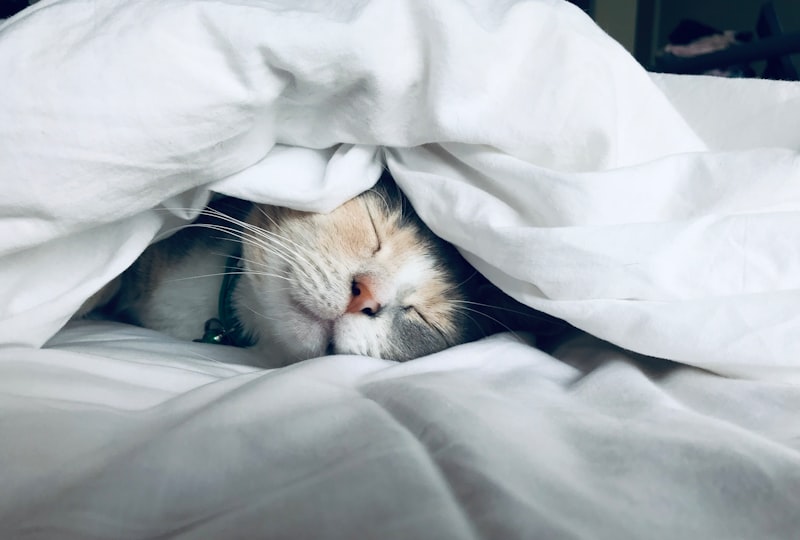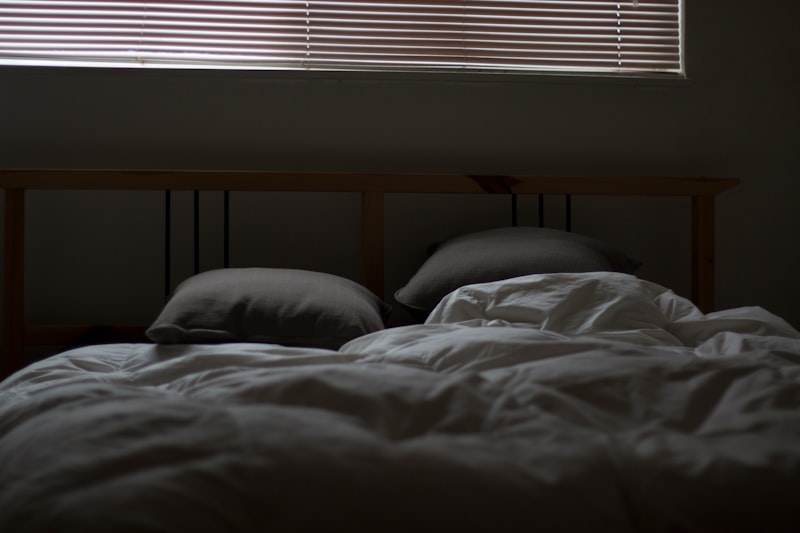Are you aware that what you eat can have a profound impact on the quality of your sleep? It's true! Diet and sleep are intricately connected, and understanding this relationship can help you improve both your eating habits and your rest. Let's delve into the fascinating details of how your diet influences your sleep.
One key factor to consider is the timing of your meals. Eating heavy or spicy foods close to bedtime can lead to discomfort and indigestion, making it difficult to fall asleep. Instead, opt for lighter, easily digestible meals in the evening. Including foods rich in tryptophan, such as turkey, bananas, or dairy products, can actually promote better sleep by increasing the production of serotonin—a neurotransmitter that regulates sleep.
Another aspect to pay attention to is your caffeine intake. We all love that morning cup of coffee, but consuming caffeine too late in the day can disrupt your sleep patterns. Caffeine stimulates the central nervous system and can stay in your body for hours. To ensure a good night's sleep, it's best to limit your caffeine consumption, especially during the afternoon and evening.
Did you know that the food you choose can also affect your sleep duration and quality? Research has shown that a diet high in refined carbohydrates and sugar can lead to more fragmented and lighter sleep. On the other hand, a balanced diet consisting of whole grains, lean proteins, fruits, and vegetables provides essential nutrients that support healthy sleep patterns.
Additionally, certain vitamins and minerals play a vital role in regulating sleep. For instance, magnesium helps relax muscles and promotes calmness, while vitamin B6 aids in the production of sleep-inducing hormones. Including foods like leafy greens, nuts, seeds, and fish in your diet can provide these essential nutrients and contribute to a good night's sleep.
maintaining a healthy diet positively impacts your sleep. By being mindful of your meal timing, moderating caffeine intake, and incorporating sleep-friendly foods into your diet, you can enhance the quality and duration of your rest. It's time to recognize the powerful connection between diet and sleep and make conscious choices for a more rejuvenating slumber. Sweet dreams!
Sleeping on Empty: The Impact of Late-Night Snacking on Your Restful Slumber
Are you tired of tossing and turning at night, struggling to get a good night's sleep? Well, the culprit might be lurking in your late-night snacking habits. Yes, you heard it right! Eating late at night can have a significant impact on the quality of your sleep. In this article, we'll delve into the details of how late-night snacking affects your restful slumber and explore some strategies to help you improve your sleep hygiene.
Picture this: it's late at night, and you find yourself craving a snack. You decide to indulge in a bag of chips or a sweet treat. While it may seem harmless at the time, consuming heavy or sugary foods close to bedtime can wreak havoc on your sleep. The digestive process requires energy, and when you eat a large meal before hitting the sack, your body focuses on digestion instead of preparing for sleep. This can lead to discomfort, heartburn, and even insomnia.
Late-night snacking not only interferes with the timing of your sleep but also impacts the quality of your rest. Research suggests that consuming high-calorie snacks before bed can disrupt your natural sleep cycles and decrease the amount of deep sleep you experience. Deep sleep is crucial for restoring your body and mind, promoting proper cognitive function, and boosting daytime productivity. By interrupting this essential stage of sleep, late-night snacking leaves you feeling groggy, unfocused, and irritable the next day.
So, what can you do to ensure a restful slumber? Start by establishing a regular eating schedule and avoid eating at least two to three hours before bedtime. Instead of reaching for unhealthy snacks, opt for lighter options that promote better sleep. Incorporate foods rich in tryptophan, such as turkey, nuts, and seeds, which contribute to the production of serotonin and melatonin, hormones that regulate sleep. Additionally, consider sipping on a cup of herbal tea, like chamomile or lavender, which has calming properties and aids in relaxation.
Remember, a good night's sleep is essential for your overall well-being. By being mindful of your late-night snacking habits, you can pave the way for improved sleep quality and wake up feeling refreshed and revitalized. So, the next time you feel tempted to raid the pantry late at night, think twice about the impact it could have on your restful slumber. Your body will thank you for it!
Sweet Dreams or Sour Nights? Unveiling the Connection between Sugar Consumption and Sleep Quality
Do you ever wonder why some nights you toss and turn, struggling to fall asleep, while other nights you peacefully drift off into dreamland? The answer may lie in your sugar consumption. Yes, that's right, the sweet treats you indulge in during the day might be affecting the quality of your sleep at night. So, let's dive deeper into the intriguing connection between sugar and sleep.
Imagine your body as a well-oiled machine, constantly striving for balance. When you consume sugary foods or beverages, your blood sugar levels spike, leading to a surge of energy. This sudden rush can make it difficult for your body to relax when it's time to hit the hay. The excess sugar stimulates your brain, making it harder to wind down and fall asleep naturally.
Not only does sugar affect the onset of sleep, but it can also impact the overall quality of your slumber. Research suggests that higher sugar intake is associated with more fragmented and less restorative sleep. This means you may find yourself waking up frequently during the night, feeling restless, and experiencing difficulty staying asleep. As a result, you wake up feeling groggy and not fully rejuvenated.
But why does sugar have such a significant effect on our sleep? One reason could be its impact on hormones. Sugar can interfere with the delicate balance of hormones like insulin, which regulates blood sugar levels, and cortisol, the stress hormone. These hormonal disruptions can disrupt your body's natural sleep-wake cycle, known as the circadian rhythm, throwing it off-kilter.
Now, before you completely banish all sugar from your life, remember that moderation is key. It's not about completely eliminating sugar; it's about making mindful choices and finding a balance. Opting for healthier alternatives like fruits that contain natural sugars or indulging in an occasional treat can help satisfy your sweet tooth without wreaking havoc on your sleep.
So, next time you reach for that tempting sugary snack before bedtime, consider the potential impact on your sleep quality. Sweet dreams may be within reach if you're mindful of your sugar intake. A little moderation can go a long way in ensuring you enjoy a restful night's sleep and wake up feeling refreshed and ready to conquer the day.
Remember, your journey to better sleep starts with understanding the connection between sugar consumption and sleep quality. Take control of your nighttime routine, make informed choices, and embrace the potential for sweeter dreams ahead.
Fueling the Night: How Proper Nutrition Can Enhance Your Sleep Patterns
Have you ever wondered why some nights you sleep like a baby, while on other occasions, you toss and turn, unable to find that elusive slumber? The answer might lie in the fuel you provide your body with. Yes, you heard it right - proper nutrition can significantly impact your sleep patterns, helping you achieve a restful night's sleep. So, let's dive into the world of nocturnal nourishment and explore how you can optimize your diet for better sleep.
Firstly, let's talk about carbohydrates. Often misunderstood, carbs are not the enemy when it comes to sleep. In fact, they can play a crucial role in promoting relaxation and drowsiness. Complex carbohydrates like whole grains, sweet potatoes, and legumes stimulate the release of serotonin, a neurotransmitter that contributes to feelings of calmness and well-being. So, incorporating these foods into your evening meal can help prepare your body for a peaceful night ahead.
Next up, let's consider the power of protein. While it's essential for muscle repair and growth, protein can also aid in improving sleep quality. Foods rich in protein, such as fish, poultry, tofu, and nuts, contain an amino acid called tryptophan. Tryptophan acts as a precursor for serotonin and melatonin, hormones that regulate sleep-wake cycles. Including a moderate amount of protein in your dinner can promote deeper and more restorative sleep.
Furthermore, don't forget the magic of magnesium. This mighty mineral plays a vital role in over 600 biochemical reactions in the body, including those involved in sleep regulation. Foods like spinach, almonds, and black beans are excellent sources of magnesium and can help relax your muscles, calm your nerves, and pave the way for a tranquil slumber.


Lastly, let's discuss the importance of hydration. Adequate water intake throughout the day can have a positive impact on your sleep. Staying hydrated keeps your body functioning optimally, ensuring that your sleep cycles are not disrupted by discomfort or nocturnal awakenings.
fueling the night with proper nutrition can work wonders for your sleep patterns. By incorporating complex carbohydrates, protein-rich foods, magnesium sources, and staying well-hydrated, you provide your body with the building blocks it needs to achieve restful and rejuvenating sleep. So, tonight, when you tuck yourself in bed, remember that what you eat during the day can profoundly influence the quality of your sleep at night. Sleep tight!
Midnight Munchies: Exploring the Link Between Late-Night Eating and Insomnia

Are you familiar with that feeling when hunger strikes in the middle of the night? It's as if your stomach has its own alarm clock, waking you up and demanding a late-night snack. Many of us have experienced these midnight munchies at some point in our lives. But did you know that indulging in late-night eating could potentially disrupt your sleep and contribute to insomnia? Let's delve into the intriguing link between midnight munchies and sleeplessness.
Late-night eating can be a double-edged sword. On one hand, it may provide temporary satisfaction and soothe those cravings. However, consuming food close to bedtime can wreak havoc on your sleep patterns. When we eat, our bodies release insulin to regulate blood sugar levels. This surge in insulin can interfere with the production of melatonin, the hormone responsible for inducing sleep. So, that delicious snack you're enjoying might actually be keeping you awake longer than you desire.
Moreover, certain types of foods can exacerbate the negative effects of midnight munchies on your sleep. Foods high in fat and sugar, such as greasy snacks or sugary treats, can stimulate your brain and make it harder to fall asleep. Additionally, spicy foods can cause indigestion or heartburn, making it uncomfortable to rest peacefully. Opting for healthier alternatives like light, protein-rich snacks or a small bowl of whole-grain cereal with milk can satiate your cravings without disrupting your sleep.
But why exactly does late-night eating affect our sleep? Our body's internal clock, known as the circadian rhythm, plays a crucial role. It regulates various biological processes, including sleep and digestion. Late-night snacking can disrupt this delicate balance, sending mixed signals to our body. It confuses our natural hunger cues and interrupts the synchronization between our biological functions and sleep-wake cycles. As a result, falling asleep and staying asleep become more challenging.


To mitigate the impact of midnight munchies on your sleep, it's essential to establish a healthy eating routine. Try to consume balanced meals during the day and avoid skipping any major meals. This practice can help reduce the likelihood of intense hunger striking late at night. Furthermore, creating a relaxing bedtime routine that doesn't involve food can promote better sleep. Engaging in activities like reading a book, meditating, or listening to calming music can signal your body that it's time for rest.
while giving in to those midnight munchies may provide temporary gratification, it's crucial to be mindful of the potential consequences for your sleep. Late-night eating can interfere with your body's natural rhythms, disrupt the production of sleep-inducing hormones, and make it harder to fall asleep. By making conscious choices about what and when you eat, you can strike a balance between satisfying your cravings and ensuring a peaceful slumber. So, next time you find yourself craving a snack late at night, consider whether it's worth sacrificing your precious sleep.
Comments
Post a Comment